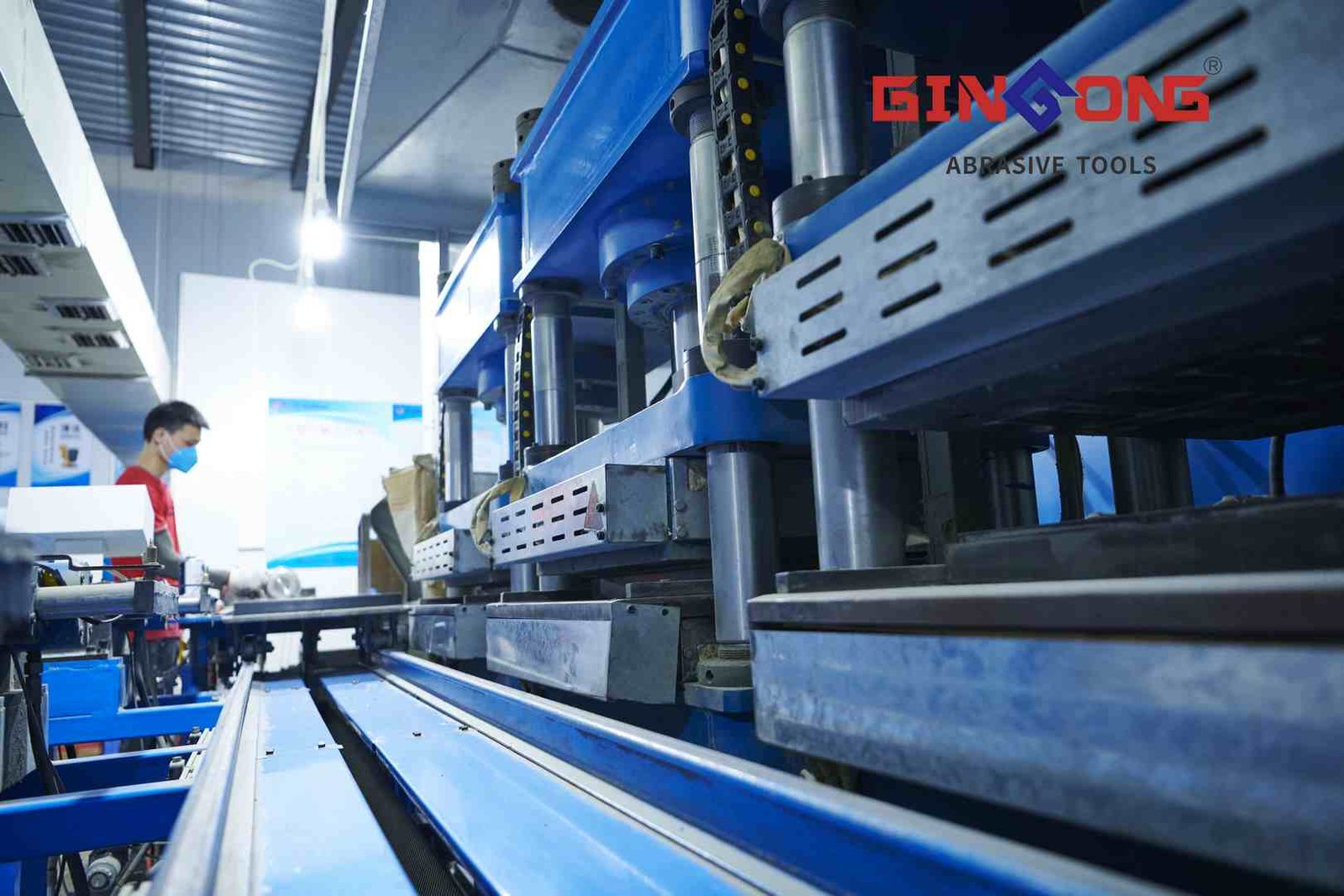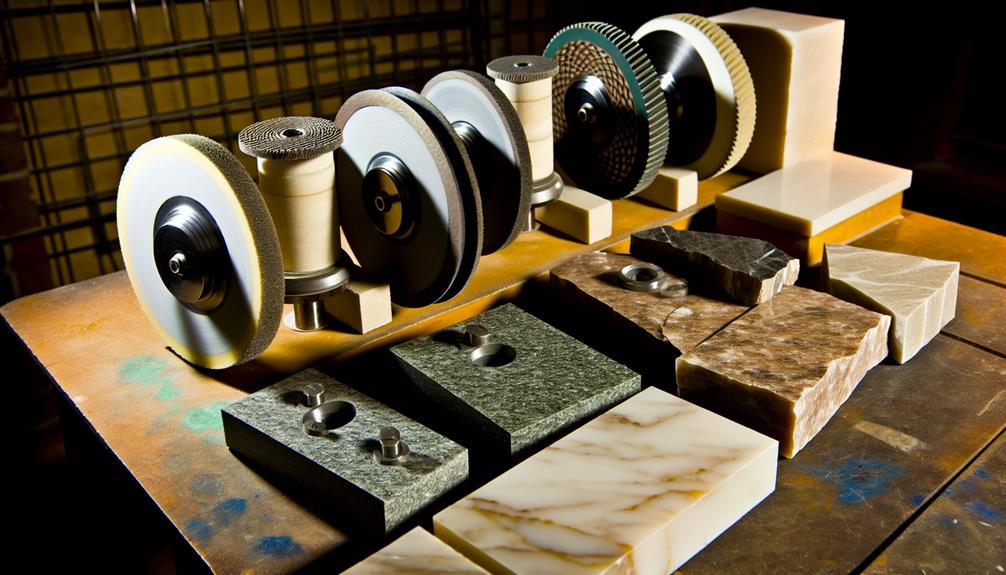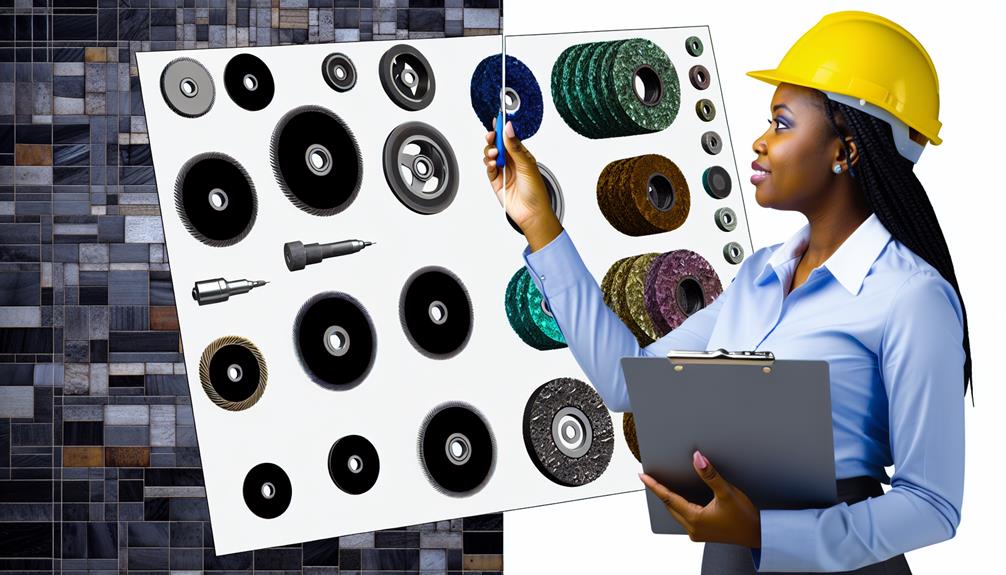In the realm of ceramic tile production, the squaring wheel stands out as a pivotal tool, instrumental in delivering precision and efficiency across various manufacturing stages. Comprising different types, each tailored to specific applications—from diamond-coated wheels renowned for their resilience and cutting prowess to water-fed options that minimize heat during operation—these tools are more than mere accessories. They are foundational to achieving a high-quality finish and maintaining workflow consistency. As we explore the nuanced benefits and applications of each squaring wheel type, one might ponder how these specialized tools could enhance their own production processes or craftsmanship standards.
A squaring wheel is an abrasive tool specifically designed to smooth and precisely square the edges of ceramic tiles during the manufacturing process. Central to its function, the wheel uses a diamond abrasive coating, which is crucial for the effective grinding and shaping of tile edges. This ensures that each tile not only fits perfectly with others when laid but also exhibits a professionally finished appearance.
These wheels are constructed from durable materials capable of withstanding the rigors of tile shaping. Typically, the core of a squaring wheel is made from a robust steel or aluminum, which is then coated with diamond abrasives. Such materials are chosen for their longevity and ability to maintain structural integrity under high friction and heat.
In terms of applications, squaring wheels are indispensable in the ceramic, porcelain, and stone tile industries. They are used not only in large-scale manufacturing settings but also in custom and specialty tile production where precision is paramount.
Maintaining these tools involves regular checks for wear and tear, ensuring the abrasive surface is free from debris that could compromise tile finishing.
Innovations in squaring wheel technology continue to focus on enhancing the precision of the tool while reducing the physical strain on the machinery and extending the life of the wheel.

Building on their utility in tile manufacturing, squaring wheels offer significant advantages across multiple industries. These tools are pivotal not just in traditional sectors like woodworking and glass fabrication but also in high-stakes fields such as aerospace and automotive manufacturing. Their primary benefit lies in precision accuracy. Squaring wheels ensure that every cut or adjustment is exact, reducing the margin for error significantly. This is crucial in industries where even the minutest discrepancy can lead to severe consequences or failures.
Furthermore, squaring wheels lead to improved efficiency. By streamlining the process of achieving perfect angles and edges, these tools minimize the time typically required for such tasks. This increase in speed does not compromise quality, thereby ensuring consistent results across all operations. The consistency provided by squaring wheels is vital for mass production environments where uniformity is a necessity.
Moreover, the use of squaring wheels results in cost savings and enhanced productivity. By reducing material wastage and rework through precise cuts, companies can save on raw materials and labor costs. Enhanced productivity, through faster processing times and fewer errors, allows businesses to maximize output and profitability, making squaring wheels an invaluable asset in various industrial processes.
To understand how squaring wheels function, it is essential to consider their design and the mechanics involved in material removal. Squaring wheels are specialized tools in the cutting process that focus on shaping materials to precise dimensions. By utilizing abrasive materials like diamond, these wheels can achieve high precision levels, essential in industries where exact measurements are critical.
The cutting process involves the squaring wheel making contact with the material, where the abrasive particles grind away the excess, achieving the desired shape and size through controlled material removal. This process is not merely about grinding down; it's about crafting with accuracy and care.
The role of lubrication cannot be overstressed in this scenario. Proper lubrication is vital for efficient cutting, as it reduces friction between the wheel and the material, which in turn minimizes wear on the wheel and prevents overheating. This not only enhances the effectiveness of the material removal but also extends the lifespan of the squaring wheel.
In exploring the variety of squaring wheels, specific models such as diamond, dry, and water squaring wheels stand out due to their unique applications.
Diamond squaring wheels are renowned for their durability and exceptional performance on hard materials.
Conversely, dry and water squaring wheels offer distinct benefits in terms of dust management and cooling effects during the squaring process.
Diamond squaring wheels play a crucial role in refining the edges of ceramic tiles, ensuring they are perfectly smooth and uniform for installation. These wheels are an essential component in the surface preparation process, leveraging the hardness of diamond abrasives to efficiently rectify and square tile edges. This capability is vital in achieving the precise geometric alignment required for high-quality tile work.
Constructed from a robust blend of synthetic diamond particles bonded to a metallic or resin base, diamond squaring wheels offer superior durability and cutting efficiency. The inclusion of diamond tooling in these wheels allows for a sharper, more precise grinding action, reducing the risk of chipping or damage to the ceramic tile during the squaring process.
The precision of diamond abrasives ensures that each tile maintains a consistent size and shape, facilitating a seamless installation with minimal grout lines.
Moreover, the effectiveness of diamond squaring wheels in removing minor imperfections and leveling tile edges contributes significantly to the overall aesthetic and functional quality of the flooring. These wheels are designed to withstand the demands of high-volume tile production, making them an indispensable tool in the ceramics industry.
While diamond squaring wheels are widely used in tile processing, dry squaring wheels offer a distinctive advantage by eliminating the need for water during the squaring process. This absence of water not only streamlines operations but also presents several efficiency advantages and dry squaring benefits.
Since there is no need for drying equipment or sewage treatment systems, production becomes more straightforward and cost-effective. Dry squaring wheels provide significant cost savings by reducing the necessity for additional machinery and by lowering maintenance expenses associated with water management systems.
Moreover, these wheels contribute positively to the environmental impact of tile manufacturing. They prevent the generation of wastewater, thereby reducing the need for water purification and disposal, which are critical in promoting sustainability in industrial operations.
In terms of performance, dry squaring wheels maintain a high standard. They ensure that tiles are squared accurately without the risk of water-related damages such as mildew, discoloration, or water stains, which can occur with high water-absorption materials.
The high performance and reliability of dry squaring wheels make them an ideal choice for manufacturers looking to enhance quality while adhering to environmental regulations and reducing operational costs.
Transitioning from dry to wet processes, the Water Squaring Wheel serves as a crucial component in ceramic tile production, utilizing water to cool the tile during high-speed grinding operations. This integration of water cooling not only enhances the process but also mitigates the thermal stress that tiles endure, preventing defects such as glaze chipping and black edges which are common in high-temperature environments.
Here are key benefits and considerations of the Water Squaring Wheel:

Selecting the appropriate squaring wheel for ceramic tile production involves considering several key factors to ensure optimal performance and results.
Firstly, the type of ceramic tiles you are working with is crucial; different tiles, such as porcelain, necessitate specific types of squaring wheels tailored to their properties.
Choosing considerations must also include the size of the tiles. Squaring wheels are available in various sizes, and selecting one that matches the dimensions of your tiles is essential for achieving the desired finish. Large tiles, for instance, will require a larger squaring wheel to ensure accurate and efficient squaring.
Material quality is another significant aspect. Opt for squaring wheels made from durable materials that promise longevity and a smooth finish. High-quality wheels prevent uneven tile edges, which can compromise the aesthetic and structural integrity of the tile work.
Budget-friendly options should not be overlooked. While quality is paramount, it's vital to find a squaring wheel that aligns with your financial constraints. Engage in comparison shopping to explore different prices and features across various brands. This approach helps in finding a squaring wheel that offers both quality and value, ensuring you make a cost-effective purchase without sacrificing performance.

Before customizing squaring wheels for your ceramic tile production, it is critical to understand the substantial impact that variations in firing temperatures and raw materials can have on the performance of abrasive tools. Customization of squaring wheels, such as diamond squaring wheels offered by Basair, must consider these factors to ensure optimal functionality and durability.
Here are important considerations:
Understanding these elements will help in achieving the best results from your customized squaring wheels.
Squaring wheels are not universally applicable across all vehicle types; their compatibility varies with specific models of off-road vehicles, luxury cars, classic cars, electric vehicles, and sports cars due to differing design requirements.
Squaring wheels, the unsung heroes of eco-friendly innovation, significantly reduce environmental impact. They utilize eco-friendly materials, support sustainability efforts, and offer recycling options, collectively minimizing the carbon footprint of transportation.
The replacement frequency of squaring wheels depends on their usage intensity and wear degree. Regular checks ensure compatibility, safety features integrity, and can influence insurance costs while maintaining eco-friendliness.
Squaring wheels can impact vehicle insurance rates by influencing premiums, depending on their compatibility and environmental impact. Insurance coverage might also consider the replacement frequency of these wheels when determining the cost of premiums.
Safety ratings for squaring wheels hinge on factors like durability, performance, and proper installation. Regular maintenance and cost efficiency also influence their safety, ensuring a balanced ride akin to a well-orchestrated symphony.
In conclusion, squaring wheels are indispensable in the ceramic tile industry due to their precision and efficiency in tile edging and finishing.
While concerns might arise regarding the initial costs of high-quality squaring wheels, the long-term benefits—marked by durability, reduced wastage, and superior finish—justify the investment.
Ultimately, the adoption of appropriate squaring wheels enhances productivity and ensures the production of high-quality ceramic tiles, pivotal for maintaining competitive advantage in the market.
GINGONG in China offers high-quality diamond polishing and edge grinding tools alongside ceramic machinery accessories. Our integrated solutions cater to individual needs, ensuring optimal performance and efficiency. We lead the industry in ceramics polishing, emphasizing effectiveness, cost control, and environmental sustainability. With "Sanmo" machines and meticulous attention to detail, GINGONG delivers top-notch abrasive products, setting the standard for excellence.
Contact us for a free quote of your ideal tool grinding wheel!
